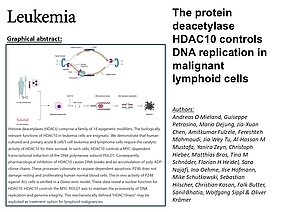New publication by the Krämer lab on how the protein deacetylase HDAC10 controls DNA replication in malignant lymphoid cells
Mieland AO, Petrosino G, Dejung M, Chen JX, Fulzele A, Mahmoudi F, Tu JW, Mustafa AM, Zeyn Y, Hieber C, Bros M, Schnöder TM, Heidel FH, Najafi S, Oehme I, Hofmann I, Schutkowski M, Hilscher S, Kosan C, Butter F, Bhatia S, Sippl W, Krämer OH (2025) The protein deacetylase HDAC10 controls DNA replication in malignant lymphoid cells.Leukemia., doi: 10.1038/s41375-025-02612-8 Link
Abstract:
Histone deacetylases (HDACs) comprise a family of 18 epigenetic modifiers. The biologically relevant functions of HDAC10 in leukemia cells are enigmatic. We demonstrate that human cultured and primary acute B cell/T cell leukemia and lymphoma cells require the catalytic activity of HDAC10 for their survival. In such cells, HDAC10 controls a MYC-dependent transcriptional induction of the DNA polymerase subunit POLD1. Consequently, pharmacological inhibition of HDAC10 causes DNA breaks and an accumulation of poly-ADP-ribose chains. These processes culminate in caspase-dependent apoptosis. PZ48 does not damage resting and proliferating human normal blood cells. The in vivo activity of PZ48 against ALL cells is verified in a Danio rerio model. These data reveal a nuclear function for HDAC10. HDAC10 controls the MYC-POLD1 axis to maintain the processivity of DNA replication and genome integrity. This mechanistically defined “HDAC10ness” may be exploited as treatment option for lymphoid malignancies.
Read the full paper: https://www.nature.com/articles/s41375-025-02612-8

